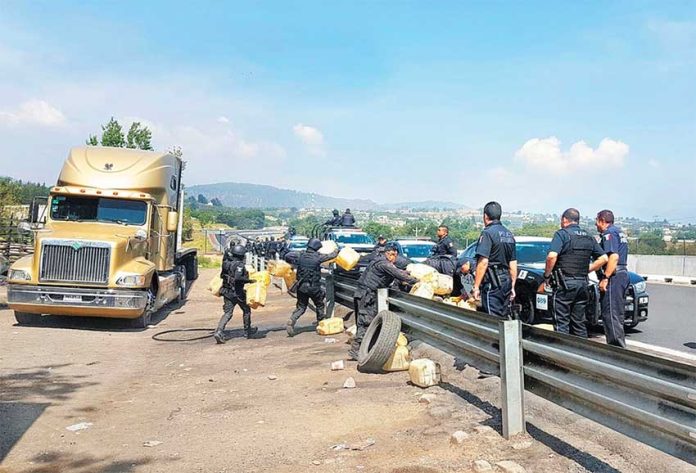Four army officers are under investigation by federal authorities for fuel theft from pipelines they were deployed to protect.
While in charge of security at the state oil company during the administration of former president Enrique Peña Nieto, General Eduardo León Trauwitz and Lieutenant Colonel Wenceslao Cárdenas Acuña – in their roles as chiefs of Pemex’s Strategic Safeguard Section (SSE) – allegedly ordered security agents under their command to “plant” illegal taps on pipelines and warned them that if they reported the location of the perforations, they would lose their jobs.
Brigadier General Sócrates Alfredo Herrera Pegueros, head of physical security for the SSE, and Infantry Colonel Emilio Gosgaya Rodríguez, head of technical management, were also allegedly complicit with the fuel theft and threats, according to documents from the federal Attorney General’s office (PGR) obtained by the newspaper Milenio.
The documents include reports made by several Pemex employees about the illegal acts they say they were ordered to carry out.
The testimonies, submitted to the PGR by lawyer Jorge García Andriano on March 24, 2017, had apparently not been taken into consideration by law enforcement authorities until the current federal government began its crackdown on fuel theft last month, Milenio said.
Other high-ranking Pemex officials, most of whom were also members of the military serving in the SSE, are also accused of involvement in the illegal activities allegedly committed by the four officers.
The Organized Crime Investigation Unit (SEIDO) of the PGR has summoned Pemex employees who made the reports against the officers to confirm their accounts.
In a letter submitted to the PGR along with the employee testimonies, García wrote that the incidents reported to him “probably constitute the crimes of abuse of authority, intimidation, threats, concealment and discrimination, in which officials of Petróleos Mexicanos [Pemex] could be involved.”
He also said that the army officers ordered security agents to cover up illegal taps to prevent fuel theft committed by “people unaffiliated” to the SSE from being discovered.
In other words, the lawyer claimed that the army personnel were complicit in fuel theft perpetrated by gangs of thieves known as huachicoleros.
According to SSE security agent Moisés Ángel Merlín Sibaja, on January 26, 2017, “his bosses” – among them General Trauwitz, Brigadier General Herrera and Infantry Colonel Gosgaya – ordered him to close off illegal pipeline taps even though they knew that such an instruction was “illegal” because he is not a petroleum engineer nor had he been trained to do so.
“The instructions were verbal, not written . . . They prohibited the worker from reporting it [the order] to other authorities under the threat of removing him from his job and . . . make him appear as an individual who participated in fuel theft,” García wrote.
“Materials and tools to disable illegal taps” were given to Merlín, the lawyer explained, while the employee supported his claim against the army officers with photographic evidence of “the work he was ordered to carry out.”
Pemex employees and officials have long been suspected of involvement in fuel theft, a crime that costs Mexico billions of pesos a year.
Last month, President López Obrador said that Pemex employees also steal fuel and distribute it and charged that the company’s managers were aware of it.
“There is a hypothesis that of all the [fuel] thefts, only about 20% is done by illegal pipeline taps,” Lopez Obrador said on December 27.
“It’s a kind of smoke-screen, and the majority is done through a scheme that involves the complicity of authorities and a distribution network,” he added.
The federal government is currently implementing an anti-fuel theft strategy that includes the deployment of military and Federal Police to protect Pemex refineries, storage facilities and pipelines.
It is also making greater use of tanker trucks to transport fuel rather than pipelines, a move that has caused gasoline shortages in more than 10 states.
Source: Milenio (sp)
